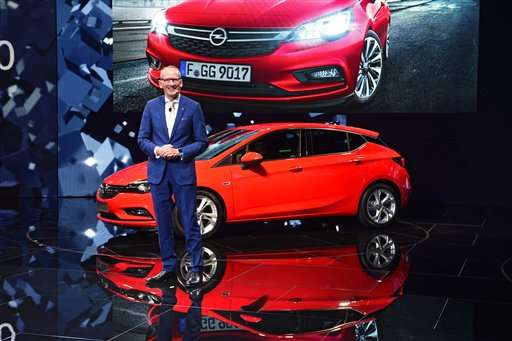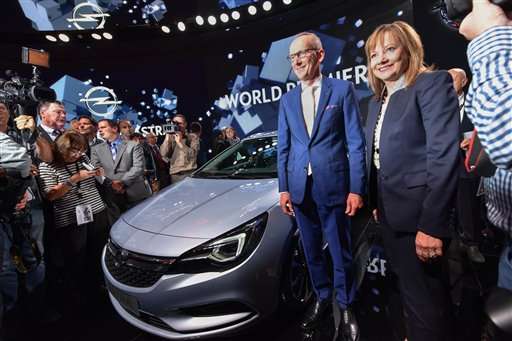Amid China woes, European carmakers look to home market

European automakers are shrugging off the threat to sales from China's struggling economy and focusing instead on growing demand in their home market, where competition is getting increasingly fierce, particularly for mass market cars.
After a summer of handwringing over turmoil in China, where many carmakers have enjoyed strong demand in recent years, the mood was upbeat at the Frankfurt auto show as reports showed sales were rising strong in Europe.
New car registrations grew 8.6 percent over the first eight months in the European Union to surpass 9 million units. Manufacturers are forecasting full-year growth of around 7 percent in the region—which will make it easier to absorb any hits from China's slowdown.
As the auto show turned on the glitz, a lot of attention was on new small cars, a market in Europe that has long been difficult to expand in.
Opel, General Motor's European brand, and France's Renault showed off new versions of their mainstay small cars, the Astra and Megane, which they spruced up with safety and entertainment technology that used to be the domain of premium models.
Both have lane departure warning and automatic emergency braking to prevent collisions. Such technologies are meant to free drivers from routine tasks and may one day lead to driverless cars.
The Astra has lost 200 kilograms (440 pounds) compared with the previous version, which should improve handling. It supports Android and Apple smartphone interfaces, enabling drivers to use apps like navigation, music and messaging through a dashboard display. It has optional massage seats and a scent dispenser. Opel also now has GM's OnStar remote roadside assistance service, which enables drivers to speak to a help center by pushing a button.
The Megane, meanwhile, includes a Bose sound system and also has advanced driving aids like an active emergency braking system and parking assistance.

As she unveiled the new Astra—its 11th version—GM CEO Mary Barra said it "will play a significant role the long-term success of Opel."
Barra stressed GM's commitment to Opel, which went through a rough patch after GM flirted with selling it following a bankruptcy restructuring in 2009. Opel has gained market share over the past three years as it works toward returning to profitability.
"Opel is vital to GM," she said.
The Astra goes on sale Oct. 10, starting at 17,200 euros, the same as its predecessor. The Astra isn't coming to the United States but its architecture could eventually be used on other GM vehicles.
While the Megane and the Astra were the most significant launches in the mass-market category, new luxury vehicles were on display in abundance. Mercedes-Benz showed off a sporty coupe version of its mid-size C-Class sedan, and a convertible version of its high-end S-Class sedan. Volkswagen's luxury brand Bentley has the Bentayga, an SUV with a massive 12-cylinder engine and a top speed of 187 mph (301 kph). Fiat Chrysler Automobiles displayed its new Alfa Romeo Giulia.
The four-door Giulia sedan is meant to relaunch the Alfa Romeo sports car brand and bring it back to the U.S. market. Brand chief Harald Wester told reporters that after the car was unveiled in June, more than 5,000 requests to buy it came in.
Alfa is aiming for sales of 400,000 a year by 2018, an ambitious goal after it sold under 68,000 cars last year. The brand is launching two new models a year after 2016, to reach eight models by 2018.
Ferrari unveiled a convertible version of its twin turbo 488 GTB launched in Geneva. Ferrari executive Enrico Galliera said the brand wasn't worried about China numbers, saying that Hong Kong and Taiwan would help make up for any slip in sales in China proper.
BMW Chief Financial Officer Friedrich Eichener was equally sanguine about China, but acknowledged that the push for new technologies is leading competitors to team up to gain advances they don't possess.
Eichener told reporters that BMW and Toyota are looking for ways to deepen their cooperation, which they launched in 2011 with a deal to develop hydrogen fuel cells and other technology. Toyota is the first to market with the Mirai hydrogen fuel cell-power car unveiled in Frankfurt.
The two carmakers also are cooperating on developing light-weight materials, shared architecture for a sports car and next generation batteries, and Toyota buys diesel engines in Europe from BMW.
"There are talks where we can intensfy the cooperation with Toyota," Eichener said.
© 2015 The Associated Press. All rights reserved.





















